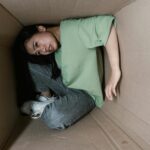Nighttime can be very pleasing for some people. It is a time when people generally tend to relax after a long day, However, for many people, nights can be associated with feelings of anxiety and discomfort This discomfort can sometimes be due to claustrophobia, an intense fear of closed places. In this article, we’ll look at reasons why some people might feel claustrophobic at night.
Reasons For Nighttime Claustrophobia
Many people feel discomfort at night before or while sleeping, due to various reasons, one of them being claustrophobia. There could be varied reasons behind the nighttime claustrophobia, such as:
-
Lack Of Sleep
Claustrophobia is associated with feelings of anxiety regarding closed places. Research suggests that a lack of sleep regularly can increase feelings of anxiety and discomfort at night. Additionally, lack of sleep can also increase cortisol levels in the body. Increased cortisol levels are associated with increased stress. Thus, lack of sleep can contribute to nighttime claustrophobia
-
Less Distractions
People can experience feelings of claustrophobia during the day. However, distractions such as work commitments and other daytime tasks often serve as a way for people to shift their focus away from anxious thoughts and feelings, promoting relaxation. But, many people are alone at night in a quiet environment. This lack of distraction and support can make it harder for them to cope with anxious feelings, leading to claustrophobia.
-
Sleep Environment
The environment around people plays a key role in how their minds and bodies feel during the night. If someone sleeps in a room where there are a lot of people, they can end up feeling claustrophobic. Likewise, feelings of claustrophobia may also increase if the room lacks appropriate ventilation or is too dark, as darkness can lead to fear amplifying claustrophobia
What Does Claustrophobia At Night Look Like?
Any form of claustrophobia often manifests in both physical and psychological symptoms. They are:
Physical Symptoms:
- Sweating or shaking.
- Tightness or heaviness in the chest or a rapid heartbeat.
- Trouble breathing or breathing rapidly.
- Chills or flushing (red, hot face).
- Choking feeling.
- Upset stomach or feeling “butterflies” in your stomach.
- Dizziness, feeling faint, or lightheaded.
- Dry mouth.
- Feeling confused or disoriented.
- Numbness or tingling.
Psychological Symptoms:
- Fear of losing control.
- Not knowing what is happening.
- Fear of fainting.
- Feelings of dread.
- Overwhelming anxiety.
- Intense need to flee or leave the situation.
- Understanding that the fear isn’t rational, but unable to overcome it.
- Fear of dying.
How Does One Deal With Nighttime Claustrophobia?
Psychotherapy is one of the most common and effective ways of dealing with Claustrophobia. Some kinds of psychotherapy are:
-
Exposure Therapy
This type of psychotherapy usually involves being gradually exposed to your feared situation. With gradual and repeated exposure, the idea is that you will eventually feel comfortable in your feared situation. This therapy also includes relaxation and breathing exercises while being exposed to the feared situation. Exposure therapy can be administered in several ways, depending on you and the therapist.
-
Cognitive Behavioral Therapy (CBT)
This form of talk therapy mainly focuses on helping you manage the phobia by changing the way you think, feel and behave. CBT typically involves talking about your symptoms and expressing your feelings. It also encourages delving deeper into your fear to figure out how to respond and manage it effectively. You’ll learn to identify, reassess, and change your thinking patterns, as well as develop problem-solving skills to better cope. Instead of avoiding your phobia, CBT emphasizes facing it directly. Additionally, the therapy teaches relaxation techniques to help keep your mind and body calm.
Apart from therapy, sometimes medications are part of claustrophobia treatment, depending on the severity of one’s symptoms
In addition to the treatment options mentioned above, here are some self-help tips for coping with nighttime claustrophobia:
- Talk to someone you trust: Having someone you trust to talk to about your claustrophobic fears can be helpful to you.
- Learn strategies to relax: Try deep breathing exercises (breathe in slowly and deeply through your nose, hold for three seconds, breathe out slowly through your mouth), meditation, mindfulness, progressive muscle relaxation (tensing and relaxing groups of muscles), and other methods to relax. You can also try to visualize and focus your attention on something that makes you feel calm and peaceful.
- Join a support group: Support groups can help know you are not alone and for sharing tips and advice.
- Check if an organization provides a course for overcoming your fear: For example, if you’re afraid of flying, check if an airline or your local airport offers a class on fear of flying.
- Take care of yourself: Eat a well-balanced diet, follow good sleep habits, and exercise for 30 minutes at least five days a week. Healthy lifestyle choices can decrease your anxiety to a large extent.
Conclusion:
Nighttime claustrophobia can be incredibly distressing and can manifest in a variety of symptoms, such as sweating or shivering, intense fear, etc. These feelings of claustrophobia at night could be influenced by factors such as lack of sleep, lack of distractions or the sleep environment as well. However, one can overcome nighttime claustrophobia with treatment options such as CBT, exposure therapy, medications and self-help techniques.
Sources-
- Panic attack specifier. In: Diagnostic and Statistical Manual of Mental Disorders DSM-5. 5th ed. Arlington, Va.: American Psychiatric Association; 2013. http://dsm.psychiatryonline.org.
- Zak RD, et al. Nightmares and nightmare disorder in adults. https://www.uptodate.com/contents/search.
- Sawchuk CN (expert opinion). Mayo Clinic, Rochester, Minn. https://www.mayoclinic.org/biographies/sawchuk-craig-n-ph-d-l-p/bio-20085911
- American Psychiatric Association. Diagnostic and Statistical Manual of Mental Disorders (DSM-5). Specific Phobia. Washington DC: American Psychiatric Association, 2013. http://repository.poltekkes-kaltim.ac.id/657/1/Diagnostic%20and%20statistical%20manual%20of%20mental%20disorders%20_%20DSM-5%20%28%20PDFDrive.com%20%29.pdf
-
Claustrophobia: What Is It, Symptoms, Causes & Treatment. (n.d.). Cleveland Clinic. Retrieved March 1, 2024, from https://my.clevelandclinic.org/health/diseases/21746-claustrophobia

